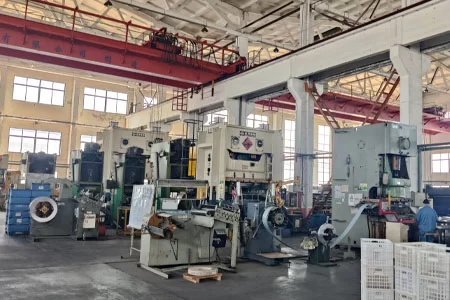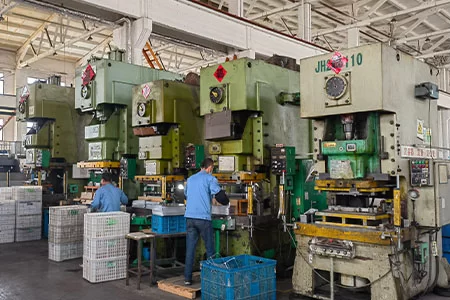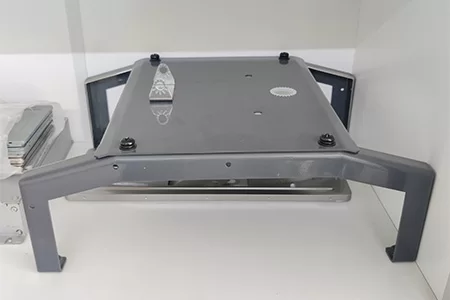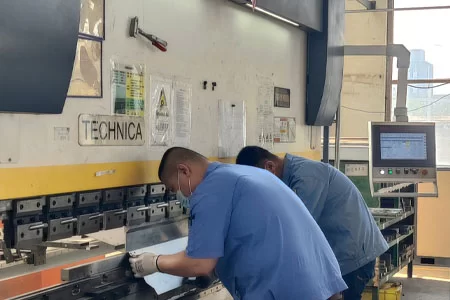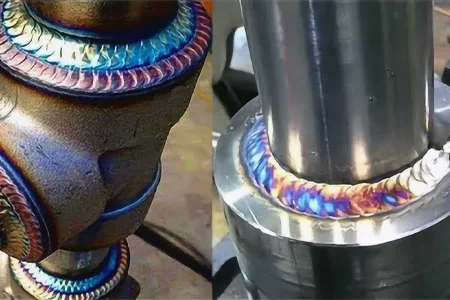In today's fast-paced data center environment, network server accessories,form the backbone of your infrastructure. This comprehensive guide explores the key factors you must consider when selecting an OEM factory for your production needs. We discuss

Your Comprehensive Guide to Selecting the Perfect OEM Manufacturing Partner
Choose A Suitable OEM Factory to Produce Your Network Server Accessories
-
Home>
-
Blog>
-
Technology>
How Should You Choose A Suitable OEM Factory to Produce Your Network Server Accessories
The Importance of a Reliable OEM Partner
In the competitive world of data centers and IT infrastructure, the quality and performance of your network server accessories are paramount. From robust racks and cabinets to precision-engineered brackets, trays, blank panels, and effective cable management systems, every component plays a crucial role in ensuring your systems operate efficiently. But behind every high-performance accessory is an OEM (Original Equipment Manufacturer) factory – a partner that transforms your technical drawings and production orders into high-quality products.
Choosing the right OEM factory is not a decision to be taken lightly. It directly impacts product quality, operational reliability, and ultimately, the success of your data center. In this guide, we delve into the various factors you need to consider when selecting an OEM partner to produce your network server accessories. We'll cover everything from production capabilities and quality control to customization options, supply chain integration, and after-sales support. Whether you need to produce standard items like racks and cabinets or specialized components such as blank panels and cable management systems, this guide will provide you with the insights necessary to make an informed decision.
Let's explore the comprehensive checklist that will help you choose a suitable OEM factory capable of meeting your high standards and production demands.
Understanding OEM Factories and Their Role in Network Server Accessories Production
What Is an OEM Factory?
An OEM factory is a specialized manufacturing facility that produces products based on the designs, specifications, and requirements provided by another company. In the context of network server accessories, an OEM partner will take your technical drawings and production orders—whether you need racks, cabinets, brackets, trays, blank panels, or cable management systems—and turn them into high-quality, production-ready components.
OEM factories allow companies to focus on core competencies such as design, marketing, and distribution, while leveraging the manufacturing expertise of their partners. This collaboration not only reduces capital investment but also accelerates time-to-market and enhances overall product quality.
The Role of OEM Partners in the Data Center Ecosystem
In modern data centers, every accessory is designed with precision to ensure optimal performance, reliability, and efficient use of space. OEM factories are responsible for producing:
Racks and Cabinets:
The structural backbone that houses servers and networking equipment.
Brackets and Trays:
Components that secure heavy equipment and facilitate proper organization.
Blank Panels:
Used to cover unused spaces in racks, ensuring proper airflow and aesthetics.
Cable Management Systems:
Essential for organizing cables, reducing clutter, and promoting effective cooling.
A reliable OEM partner ensures that these components meet strict industry standards in terms of dimensions, tolerances, and material properties, which is crucial for maintaining a high-performance data center.
Key Factors to Consider When Choosing an OEM Factory
Selecting the right OEM factory requires careful evaluation of several critical factors. Below, we detail the main criteria that will guide you in making an informed decision.
Experience and Technical Expertise
Why It Matters:
Experience is often a proxy for reliability. An OEM factory with years of proven experience in metal processing and sheet metal fabrication is more likely to understand the nuances of producing network server accessories.
What to Look For:
Years in Business:
A long track record indicates stability and accumulated expertise.
Specialization:
Ensure the OEM has specific experience with network server accessories or similar high-precision components.
Technical Competence:
Evaluate their ability to produce a variety of products—racks, cabinets, brackets, trays, blank panels, and cable management systems—while maintaining strict tolerances and high-quality standards.
Takeaway:
A partner with deep industry expertise will better handle complex orders and deliver products that meet your stringent requirements.
Production Capabilities and Equipment
Why It Matters:
High-end production capabilities ensure that your components are manufactured with precision and consistency. Modern equipment not only improves efficiency but also guarantees that the final product adheres to your design specifications.
What to Look For:
Advanced Machinery:
Look for capabilities like precision laser cutting, CNC bending, and automated stamping. These technologies help achieve tolerances as tight as ±0.2 mm.
Material Processing:
The OEM should be adept at processing various materials (steel, aluminum, high-grade plastics, composites) in different thickness ranges (typically 1.5 mm to 2.5 mm).
Scalability:
The facility must handle both small-batch prototypes and large-scale production runs without compromising quality.
Production Flexibility:
Ensure that they can adjust to design changes and custom orders quickly.
Takeaway:
An OEM with advanced production equipment and flexible capabilities will reliably produce high-quality network server accessories that fit your data center's needs.
Quality Control and Certifications
Why It Matters:
Robust quality control is essential to prevent defects and ensure the long-term durability of your network server accessories. Consistent quality reduces downtime and maintenance costs.
What to Look For:
Quality Assurance Protocols:
Look for continuous in-process inspections and final product testing.
Industry Certifications:
Certifications like ISO 9001 are a good indicator of adherence to global quality standards.
Testing Capabilities:
The facility should have in-house labs or testing systems to check material properties, load-bearing capacity, and thermal performance.
Takeaway:
An OEM with rigorous quality control practices and recognized certifications is a safe bet for high-reliability products.
Customization and Design Flexibility
Why It Matters:
Data centers often require bespoke solutions that standard off-the-shelf components cannot provide. Customization allows you to tailor products to specific design and operational requirements.
What to Look For:
Tailored Solutions:
Check if the OEM can produce custom dimensions, integrated features (such as built-in cable management clips), and specific surface finishes.
Flexible Production Lines:
The factory should be capable of quickly adapting to design modifications or unique orders.
Technical Support:
A responsive engineering team that can work with you to refine designs and optimize production for manufacturability.
Takeaway:
Customization ensures that your network server accessories perfectly align with your infrastructure needs, particularly in complex or high-density environments.
Supply Chain Integration and Logistics
Why It Matters:
An integrated supply chain minimizes production delays and ensures consistent quality from raw material sourcing to final delivery.
What to Look For:
End-to-End Management:
The OEM should handle everything from material procurement and production to packaging and logistics.
Efficient Inventory Management:
Robust systems for managing both small and large orders.
On-Time Delivery:
Strong logistics capabilities ensure that production schedules are met without delays.
Takeaway:
A fully integrated supply chain means fewer disruptions, timely deliveries, and overall smoother project execution.
Pricing and Cost Transparency
Why It Matters:
While quality is essential, understanding the cost structure is equally important. Transparent pricing helps you make an informed decision without unexpected expenses.
What to Look For:
Detailed Quotations:
The OEM should provide a clear breakdown of costs including raw materials, labor, finishing, and logistics.
Competitive Pricing:
Compare multiple proposals while considering long-term value rather than just the lowest price.
Value Over Time:
Consider the potential savings from reduced maintenance and longer product life due to higher quality.
Takeaway:
Transparent pricing helps ensure you're investing in a cost-effective solution that aligns with your quality and reliability requirements.
Communication, Customer Support, and After-Sales Service
Why It Matters:
Effective communication is key to preventing misunderstandings and ensuring that production aligns with your expectations. Strong customer support is critical if issues arise.
What to Look For:
Dedicated Account Management:
A single point of contact who understands your project requirements.
Proactive Updates:
Regular communication regarding production progress and any potential issues.
After-Sales Service:
Look for a clear policy on returns, exchanges, or replenishments in case of quality issues or shipment shortages. (For HULK Metal, note that they provide after-sales support for quality or shipment problems.)
Takeaway:
A partner with excellent communication and customer support can resolve issues quickly and maintain smooth operations.
Sustainability and Innovation
Why It Matters:
Sustainable and innovative practices not only reduce environmental impact but also often result in better quality products and cost efficiencies over time.
What to Look For:
Eco-Friendly Practices:
The OEM should use sustainable production methods, energy-efficient processes, and waste reduction strategies.
Investment in R&D:
A commitment to innovation ensures that the manufacturing processes and products are up-to-date with industry trends.
Future-Proofing:
The ability to adapt to new materials and technologies that could enhance performance and durability.
Takeaway:
An OEM focused on sustainability and innovation is likely to deliver products that not only meet today's needs but are also ready for future challenges.
Evaluating Proposals and Visiting OEM Facilities
Once you've shortlisted potential OEM partners based on the criteria above, the next step is to evaluate their proposals and, if possible, visit their manufacturing facilities.
Requesting Detailed Proposals
What to Ask For:
A detailed description of their production capabilities, quality control processes, and customization options.
Information on lead times, pricing models, and order scalability.
Case studies or references from similar projects involving racks, cabinets, brackets, trays, blank panels, and cable management systems.
Evaluation Tips:
Compare the proposals on both cost and overall value.
Look for transparency in cost breakdowns and production timelines.
Ask for examples of past work to verify their expertise.
Factory Visits and Audits
Benefits of On-Site Visits:
Firsthand Inspection:
See the equipment in action—precision laser cutting, CNC bending, and automated stamping—to verify their production capabilities.
Quality Assurance:
Observe quality control measures, from raw material inspection to final testing.
Operational Efficiency:
Evaluate the organization, safety standards, and scalability of the facility.
Team Interaction:
Meet the production and technical teams to assess their responsiveness and expertise.
How It Helps You:
Visiting the factory builds confidence in the manufacturer's ability to deliver on promises and helps you identify any potential red flags before entering into a partnership.
Best Practices for a Successful OEM Partnership
Develop Clear Specifications
Before approaching any OEM, ensure that you have a detailed specification for your network server accessories. This should include:
Precise dimensions (for racks, cabinets, brackets, trays, blank panels, and cable management systems).
Material requirements, including thickness and surface finish.
Functional features such as ventilation, load capacity, and integrated cable management.
Tolerance levels and quality benchmarks.
Clear specifications reduce miscommunication and ensure that the final product aligns perfectly with your needs.
Focus on Quality Over the Lowest Price
While competitive pricing is important, remember that the lowest bid may lead to compromises in quality. Consider:
The long-term cost benefits of reliable, durable components.
Reduced maintenance and downtime resulting from superior quality.
Comprehensive after-sales support that minimizes operational disruptions.
Investing in quality now can save significant costs and headaches in the future.
Maintain Open and Transparent Communication
A successful partnership hinges on clear, regular communication. Ensure that:
You have a dedicated account manager who understands your project.
The OEM provides regular production updates and is proactive in addressing issues.
Any design modifications or concerns are promptly discussed and resolved.
Good communication builds trust and ensures the project stays on track.
Consider Future Scalability
Data center requirements can evolve rapidly. When choosing an OEM:
Assess their ability to scale production as your business grows.
Ensure they can incorporate new technologies or design modifications as needed.
Evaluate whether their production processes can adapt to increased order volumes without sacrificing quality.
A scalable partner ensures that your infrastructure remains robust and future-proof.
Prioritize a Comprehensive Service Package
Beyond manufacturing, consider the OEM's overall service package:
Look for end-to-end supply chain integration that minimizes delays.
Check that they offer robust after-sales support—including returns, exchanges, and replenishments for quality issues or shipment shortages.
Ensure that the OEM's service model aligns with your long-term operational goals.
A comprehensive service package reduces risks and improves overall project success.
Future Trends in OEM Manufacturing for Network Server Accessories
Increasing Production Efficiency
As data centers continue to evolve, so too will the demand for higher production efficiency. Advances in automated manufacturing—such as AI-driven quality control and smart production scheduling—are poised to further tighten tolerances and reduce lead times, ensuring that network server accessories are produced faster and more reliably.
Emphasis on Sustainability
Sustainability is becoming a key focus in manufacturing. Future OEM partners will likely incorporate eco-friendly production practices, including waste minimization, energy-efficient processes, and the use of sustainable materials. These innovations not only benefit the environment but also reduce long-term operating costs.
Customization and Flexibility
The ability to rapidly adapt to evolving market demands will be a crucial competitive advantage. OEMs that invest in flexible production lines and maintain a commitment to customization will be better positioned to meet the unique requirements of tomorrow's data centers.
Integrated Digital Solutions
Digital integration across the production process—from raw material tracking to final quality testing—will become more prevalent. Enhanced traceability and data-driven production will allow OEMs to further optimize their processes and ensure higher levels of product quality.
Conclusion: Making an Informed Decision for Your Network Server Accessories Production
Choosing the right OEM factory to produce your network server accessories is a multifaceted decision that can significantly impact your data center's performance and operational reliability. By focusing on key factors such as experience, advanced production capabilities, rigorous quality control, customization, supply chain integration, transparent pricing, effective communication, and a strong commitment to innovation and sustainability, you can select an OEM partner that not only meets but exceeds your expectations.
In summary, here are the main takeaways:
Experience and Expertise:
Prioritize OEMs with a proven track record and specialized knowledge in network server accessories.
Production Capabilities:
Ensure they have modern, high-precision equipment capable of tight tolerances and scalable production.
Quality Control:
Look for rigorous testing protocols and internationally recognized certifications.
Customization:
Choose a partner who offers flexible, tailored solutions to meet your specific needs.
Supply Chain Integration:
An end-to-end supply chain minimizes delays and ensures consistent quality.
Transparent Pricing:
Clear cost breakdowns help you understand the true value of your investment.
Communication and Support:
A responsive partner with robust after-sales service is critical to long-term success.
Future-Proofing:
Emphasize sustainability and continuous innovation to stay ahead of evolving market demands.
By following this comprehensive guide, you'll be well-equipped to choose an OEM factory that can deliver high-quality, reliable network server accessories. With a partner like HULK Metal—known for its advanced contract manufacturing capabilities and excellent after-sales support for quality issues or shipment shortages—you can build a data center infrastructure that is efficient, scalable, and built to last.
Invest wisely in an OEM partner that understands your technical and operational requirements, and enjoy the peace of mind that comes from knowing every component in your network is manufactured to the highest standards.
Final Thoughts
In today's rapidly evolving IT landscape, every decision counts. The quality of your network server accessories directly impacts the performance, reliability, and scalability of your data center. By carefully evaluating OEM partners using the criteria outlined in this guide, you can ensure that your production processes run smoothly, your components fit perfectly, and your infrastructure remains robust in the face of future challenges.
Take the time to gather detailed proposals, visit manufacturing facilities if possible, and ask the right questions. With the right OEM partner, you not only gain a reliable production line but also a long-term collaborator dedicated to helping your business grow.
Remember, your data center's success is built on the foundation of every well-engineered component. Choose an OEM that shares your commitment to quality and innovation, and you'll be well on your way to creating a truly world-class network infrastructure.
Thank you for reading this comprehensive guide on how to choose a suitable OEM factory to produce your network server accessories. We hope you now have the insights and practical tips needed to make an informed decision that will support your data center's success for years to come.
This detailed guide has explored all the factors you need to consider when selecting an OEM factory for your network server accessories—ranging from racks, cabinets, and brackets to trays, blank panels, and cable management systems. By following these best practices and focusing on long-term quality and reliability, you can ensure that every piece of your network infrastructure is manufactured to the highest standards, enabling your data center to perform at its very best.
Every decision you make today sets the stage for tomorrow's success. Choose wisely and build a robust, efficient, and scalable network environment with a trusted OEM partner.
Article Navigation
Article Navigation
Industries
Foundries
-

November.21, 2024
HULK Metal Stamping Factory Show
READ MORE
-

October.18, 2024
HULK Metal Fabrication
READ MORE
-

October.29, 2024
Introduction to Sheet Metal Forming: Processes, Materials, and Choosing the Right Partner
READ MORE
-

October.24, 2024
Comprehensive Guide to Sheet Metal Blanking
READ MORE
-

September.30, 2024
Comprehensive Understanding of Sheet Metal Welding
READ MORE



